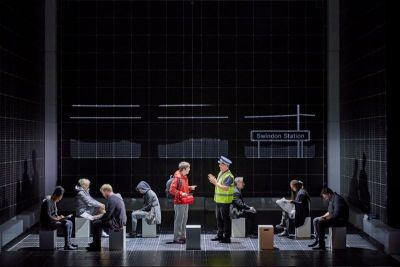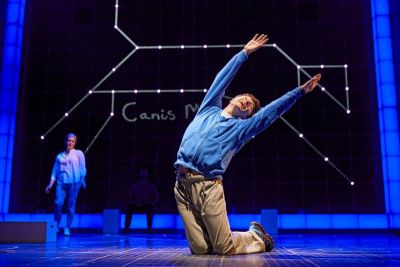The Curious Incident of the Dog in the Night-Time
The Curious Incident tells its curious story from the point of view of Christopher Boone (Joshua Jenkins), an autistic teenager, a maths genius, living in Swindon in England with his Dad, Ed (David Michaels), who’s told him that his mother, Judy, is dead. One night, Christopher discovers their neighbour’s dog dead on her front lawn, impaled on a garden fork. (The chalk line around the corpse – the classic murder scene – remains as a reminder to the end of the play.) His determination to find the dog’s killer kick starts the plot.
Enormous resources and ingenuity have been devoted to this adaptation of Mark Haddon’s very simple, no frills novel. Mr Haddon thought it was unadaptable and I’ve not seen Simon Stephens’ play text, but this visually dazzling production succeeds brilliantly in taking us into Christopher’s autistic mind and having us see the world as he does. His autism is, paradoxically, the undoubted and proven appeal of the character: he takes ‘literal minded’ to new levels – a source of welcome humour – and his apparent lack of empathy – or ‘good manners’ - means he cuts through the polite evasions and double-talk to which most of us resort every day. Of course, because we (or most of us) are not autistic, we can see what Christopher is missing when he talks to other people, including his sympathetic teacher, Siobhan (a patient, maternal Julie Hale). His ‘missing the point’ is another source of humour, but we are never invited to look down on him, much less to pity him. On the contrary, we come to admire his determination and his courage in overcoming obstacles, internal and external, despite his disability. It’s his determination, in fact, that drives the story to the very end.
 This immensely popular, high prestige, award winning (Olivier and Tony awards) National Theatre production (although not with the original cast) has been imported whole – cast, direction and mind-boggling set - by the Melbourne Theatre Company and Arts Centre Melbourne. (Coral Drouyn and I each reviewed the NTL presentation of the original production in 2014 for Stage Whispers. Back then, I wished I’d been in the live theatre audience since filming the production rather killed the magic. Now I have. The magic is more magic, but my reservations remain.)
This immensely popular, high prestige, award winning (Olivier and Tony awards) National Theatre production (although not with the original cast) has been imported whole – cast, direction and mind-boggling set - by the Melbourne Theatre Company and Arts Centre Melbourne. (Coral Drouyn and I each reviewed the NTL presentation of the original production in 2014 for Stage Whispers. Back then, I wished I’d been in the live theatre audience since filming the production rather killed the magic. Now I have. The magic is more magic, but my reservations remain.)
The show is, clearly, a successful piece of theatre. The audience is kept in a state of suspense (will Christopher succeed?), fearing for his safety, constantly laughing at his interpretations of his world, and kept in a state of gaping admiration and delight by the production itself.
Within a proscenium arch setting (the London NTL production played in the round – a much more effective setting), an almost bare stage is dominated by three high walls. They and the floor are ‘alive’ with lights, drawings, diagrams, maps, station names and formulae – all threatening to overwhelm our hero. Bunny Christie’s design finds a way – a highly technological way – to take Christopher on his journey. The design is immeasurably enhanced by Lighting Designer Paule Constable, Video Designer Finn Ross and Sound Designer Ian Dickinson; all are inextricably equal stars of the show.
Apart from the principals, an ensemble of chameleon multi-role players – Debra Michaels, Amanda Posener, Oliver Boot, Matt Willman, Crystal Condie and Bruce McGregor create not just detailed individual characters – neighbours, policemen, a clergyman, the headmistress, but - superbly choreographed by Scott Graham and Steven Hoggett - street crowds, train travellers and London Tube commuters.
What if we take away the bells-and-whistles whizz-bangery? No, it is all of a piece, but the story of Curious Incident is, as remarked, pretty simple, verging on soap, made intriguing and engaging because of the way we experience it – i.e. via Christopher’s autistic vision. That vision is stripped of sentiment, but the play is sentimental (about disability) at the same time.
 Intent on finding the killer of the dog, Christopher discovers shocking things about his parents. As a result, he makes the perilous (for him) journey from Swindon all the way to Willesden Green – to find (spoiler alert) his mother Judy (Emma Beattie). Although we travel with him and invest in his quest for the truth, what touches our emotions and moves us is Christopher’s father Ed’s near inarticulate love and frustration as a single parent of this boy, and Judy’s grief, guilt and reawakened protectiveness. Both roles are both beautifully cast: Mr Michaels makes his helplessness and anger palpable, while Ms Beattie finds a persona that is warm, impulsive and strong. We believe she’d abandon an autistic kid and run off with a lover. A little flashback (so to speak) to a beach holiday nails the character exactly: we don’t forgive her, but we certainly understand.
Intent on finding the killer of the dog, Christopher discovers shocking things about his parents. As a result, he makes the perilous (for him) journey from Swindon all the way to Willesden Green – to find (spoiler alert) his mother Judy (Emma Beattie). Although we travel with him and invest in his quest for the truth, what touches our emotions and moves us is Christopher’s father Ed’s near inarticulate love and frustration as a single parent of this boy, and Judy’s grief, guilt and reawakened protectiveness. Both roles are both beautifully cast: Mr Michaels makes his helplessness and anger palpable, while Ms Beattie finds a persona that is warm, impulsive and strong. We believe she’d abandon an autistic kid and run off with a lover. A little flashback (so to speak) to a beach holiday nails the character exactly: we don’t forgive her, but we certainly understand.
Joshua Jenkins’ Christopher can’t be faulted: he maintains the autistic persona without let-up to the very end – and beyond. But we feel for him rather than with him. I can’t help wondering whether a great deal of the trompe l’oeil effects, tricks and visual gags paper over a certain thinness. For instance, Christopher’s journey to the London suburbs (which Christopher himself later describes as ‘brave’ – and considering his disability and life experience, it is) is a rather long sequence that has the audience amazed at the way it is achieved (flashing lights and signs, rocketing trains, buffeting crowds, unhelpful station staff and police). It’s a tour de force, but what it enacts and illustrates is Christopher’s bravery. It’s telling us, ’Look how awful this is for him and how brave he is!’ But, really, no more than that. Similarly, during much of Act 1, Christopher lays out a model railway – tracks, engine and carriages, stations, house, trees, even London with Big Ben and the Centennial Wheel. It looks like Christopher ‘business’ (yes, he would do that) as he explains himself to Siobhan (a very useful character), but, as he makes the definite decision to go to London, come what may, the toy train lights up and moves off along its tracks. Blackout. End of Act 1. The audience applauds: it’s a pay-off to a set-up and it is clever and fun. But it’s also a gimmick, a buzz that contributes nothing to Christopher’s story.
 Given my quibbles, how then to explain the popularity and longevity of this show? One might say it is the production itself, but the play itself has been produced over forty times and many of those times in low resource venues without the technology – so it can’t depend on the technology. More likely, it is that it is a ‘triumph of the underdog’ story and, moreover, an underdog who sees the world in his autistic way (novel and funny) and who ‘acts out’ – that is, acts out as we might like to do, or fantasise we would do, were we not hampered by ‘empathy’ or etiquette or convention. (C.f. Jack Nicholson in As Good As It Gets, or Frances McDormand in Three Billboards Outside Ebbing, Missouri, or even Harpo Marx.) Christopher is disruptive of the normal and that’s always exciting. And besides: he wins.
Given my quibbles, how then to explain the popularity and longevity of this show? One might say it is the production itself, but the play itself has been produced over forty times and many of those times in low resource venues without the technology – so it can’t depend on the technology. More likely, it is that it is a ‘triumph of the underdog’ story and, moreover, an underdog who sees the world in his autistic way (novel and funny) and who ‘acts out’ – that is, acts out as we might like to do, or fantasise we would do, were we not hampered by ‘empathy’ or etiquette or convention. (C.f. Jack Nicholson in As Good As It Gets, or Frances McDormand in Three Billboards Outside Ebbing, Missouri, or even Harpo Marx.) Christopher is disruptive of the normal and that’s always exciting. And besides: he wins.
Michael Brindley
Photos by Brinkhoff Mögenburg.
Subscribe to our E-Newsletter, buy our latest print edition or find a Performing Arts book at Book Nook.

